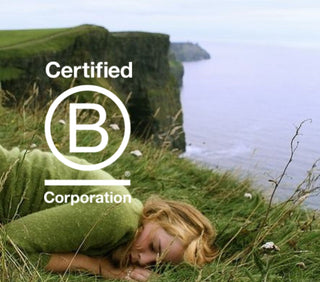- At Ecocious, we do the research, so you don't have to!
Everything you need to know about "B-Corp Certified"
In a world where the impact of consumerism on the environment is undeniable, sustainable shopping has become more than just a buzzword; it's a responsibility.
One of the ways to ensure that your shopping choices align with your commitment to sustainability is to look for products from B-Corporations.
But what exactly is a B-Corp, and why is B-Corp certification important when it comes to sustainable shopping?
In this blog post, we will explore the concept of B-Corporations, delve into the B-Corp certification process, and discuss the significance of shopping sustainably in today's world.
Understanding B-Corporations
Before we dive into the world of B-Corp certification, it's essential to understand what B-Corporations are and how they differ from traditional for-profit companies.
Beyond Profits:
B-Corps, or Benefit Corporations, are a new type of business entity that goes beyond the conventional focus on maximising profit.
They are legally required to consider the impact of their decisions on not only their shareholders but also on the environment, employees, customers, and the communities in which they operate.
Triple Bottom Line:
Traditional companies typically measure success in terms of their financial bottom line.
B-Corps, on the other hand, adhere to the concept of the "triple bottom line," which considers social and environmental performance alongside financial performance. This approach emphasizes the importance of people, planet, and profit.
Legal Commitment:
To become a B-Corp, a company must legally commit to these principles by changing its corporate governance structure.
This commitment ensures that the company's mission to balance purpose and profit remains intact even if there are changes in leadership or ownership.
There are currently 7,578 Companies across 161 industries in 92 Countries that are certified B corp today.
The B-Corp Certification Process
Now that we have a better understanding of what B-Corp represents, let's delve into the certification process, which is crucial for identifying companies that prioritise sustainability above all else.
Voluntary Assessment:
The B-Corp certification process begins when a company voluntarily decides to pursue certification. This signifies the company's commitment to meeting rigorous standards of social and environmental performance.
Assessment and Verification:
The company undergoes a comprehensive assessment conducted by the nonprofit organization B Lab. This assessment evaluates the company's impact on various stakeholders, including employees, communities, customers, and the environment. To attain B-Corp status, a company must earn a minimum score.
Continuous Improvement:
The Importance of B-Corp Certification in Sustainable Shopping
Now that we've demystified the concept of B-Corps and their certification process, let's explore why B-Corp certification is significant for sustainable shopping.
- Accountability and Transparency
When you shop from B-Corps, you can be confident that these companies are held to a higher standard of accountability and transparency. The certification process ensures that they report their social and environmental impact, enabling you to make informed choices. This transparency empowers consumers to support businesses that align with their values.
- Aligning with Your Values
Sustainable shopping is not just about buying eco-friendly products; it's about supporting companies that prioritize the well-being of their employees, their communities, and the planet. B-Corps align with these values, making it easier for conscious consumers to shop ethically.
- Encouraging Industry Transformation
By choosing B-Corps over conventional companies, you are actively participating in the transformation of industries. As more consumers demand sustainable products, companies are incentivized to adopt responsible practices, thereby driving positive change in the business world.
- Impact on Communities
B-Corps often invest in their local communities and create meaningful, long-lasting partnerships. When you shop from these companies, you are indirectly contributing to community development and social welfare.
- Reducing Environmental Impact
B-Corps are committed to minimizing their environmental footprint. From sustainable sourcing to reducing waste and energy consumption, they take comprehensive steps to protect the planet.
When you shop from B-Corps, this is what you are supporting:
Promoting Fair Labor Practices
Ethical treatment of employees is a core value for B-Corps. They often provide fair wages, safe working conditions, and opportunities for employee growth and development. Your purchases from these companies help create a more equitable and just workplace.
Encouraging Competition
As consumers increasingly prioritize sustainability, traditional companies are encouraged to compete with B-Corps by adopting ethical practices. This competition fosters innovation and a shift towards more responsible business models.
Examples: B-Corps leading the way
Let's take a look at a few B-Corps that have made a significant impact and exemplify the essence of sustainable shopping:
- Patagonia: Known for its commitment to environmental responsibility, Patagonia has been a trailblazer in the sustainable apparel industry. They prioritize using recycled materials, reducing waste, and supporting environmental causes.
- Outland Denim: Outland Denim is a B-Corp certified brand that specializes in producing high-quality, ethical, and sustainable denim jeans. They are committed to transparent supply chains, fair labor practices, and minimizing their environmental impact.
READ OUR BLOG POST WITH OUTLAND DENIM HERE
LISTEN TO OUR PODCAST WITH OUTLAND DENIM HERE
READ OUR INTERVIEW WITH OUTLAND DENIM FOUNDER, JAMES BARTLE HERE
- Bluem: Ecocious Partner, not only carbon neutral, but the first beauty brand in Australia to be carbon positive!! Our natural beauty and clean skincare partner Bluem has just been certified as B- Corp and we couldn't be more proud!
READ OUR INTERVIEW WITH BLUEM FOUNDER, MONTANA LOWER HERE
READ OUR BLOG POST ON BLUEM HERE
The time it takes to become B-Corp certified can vary depending on several factors, including;
- the complexity of your business operations
- your commitment to sustainability and social responsibility, and
- the efficiency with which you gather the necessary documentation and complete the assessment process.
On average, the B-Corp certification process can take anywhere from 6 to 12 months.
Here's a breakdown of the process:
- Pre-assessment and Preparation (1-2 months): Before you start the formal assessment, you should familiarize yourself with the B Impact Assessment, which is the tool used to measure your company's social and environmental performance. During this phase, you can identify areas where your company might need to improve to meet B-Corp standards.
- Formal Assessment (2-3 months): You will need to complete the B Impact Assessment, which can be quite comprehensive, depending on the size and complexity of your business. This assessment evaluates your company's impact on various stakeholders, including employees, communities, customers, and the environment.
- Documentation and Evidence Gathering (2-3 months): You will need to gather supporting documentation and evidence to verify the claims made in your assessment. This can include financial records, sustainability reports, employee policies, and other relevant documents.
- Review and Verification (1-2 months): Your assessment and documentation will be reviewed by B Lab, the nonprofit organization behind B-Corp certification. They may request clarifications or additional information during this phase.
- Certification and Legal Changes (1-2 months): If your company meets the required score and criteria, you'll receive B-Corp certification. You may need to make legal changes to your corporate governance structure to align with B-Corp requirements.
- Ongoing Improvement (indefinite): Once you're certified, you commit to ongoing improvement and transparency. B-Corps are expected to continually work on enhancing their impact on the world, so this phase is ongoing.
The B-Corp certification is not just a label; it's a commitment to a better world. When you shop from B-Corps, you play an essential role in promoting ethical business practices, reducing environmental impact, and supporting the well-being of communities and employees.
It's a conscious choice to align your values with your purchasing decisions and contribute to a sustainable and equitable future.
In a world where our choices as consumers carry immense power, let's use that power to support businesses that are genuinely committed to creating a positive impact. B-Corps are leading the way, and by choosing them, we can all be part of the solution in the journey toward a more sustainable and responsible future.


